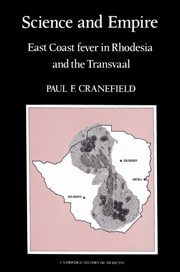Book contents
- Frontmatter
- Contents
- List of illustrations
- Preface
- Acknowledgments
- 1 Prologue
- 2 The places and the players
- 3 A new disease?
- 4 The search for an expert
- 5 Robert Koch in Bulawayo
- 6 Joseph Chamberlain
- 7 Arnold Theiler, Charles Lounsbury and Duncan Hutcheon
- 8 The fight against East Coast fever
- 9 The African-owned cattle in Rhodesia
- 10 Two more parasites and another new disease
- 11 What is East Coast fever?
- 12 Epilogue
- Notes and references
- Index
3 - A new disease?
Published online by Cambridge University Press: 19 January 2010
- Frontmatter
- Contents
- List of illustrations
- Preface
- Acknowledgments
- 1 Prologue
- 2 The places and the players
- 3 A new disease?
- 4 The search for an expert
- 5 Robert Koch in Bulawayo
- 6 Joseph Chamberlain
- 7 Arnold Theiler, Charles Lounsbury and Duncan Hutcheon
- 8 The fight against East Coast fever
- 9 The African-owned cattle in Rhodesia
- 10 Two more parasites and another new disease
- 11 What is East Coast fever?
- 12 Epilogue
- Notes and references
- Index
Summary
The first false trail in the history of East Coast fever arose from the belief that it was a virulent form of redwater introduced into Rhodesia by cattle that were imported by Cecil Rhodes at the end of 1900 to replenish the herds that had been destroyed by rinderpest. On May 26, 1900, while on a visit to Rhodesia, Rhodes wrote to the High Commissioner for South Africa, Alfred Milner, as follows:
The bearer, Mr. Ross, one of our native commissioners, is going to Australia to buy cattle; kindly advise him and give him a letter of introduction. I am already preparing for settling the Colonial or Englishman choosing to remain. I have added to irrigating ideas, dry farms with cattle, and am sending Ross to Australia to buy the first 1,000 head … The Colonials are very pleased with this country [Rhodesia] and they must remain, at any rate some …
I want to settle the Colonials, start the railway to the Victoria Falls, see the mines personally and form my judgment as to gold prospects, help Milton to start his North-Eastern Rhodesia and see to the telegraph to Egypt, besides many other minor details.
The cattle (999 of them) arrived at the port of Beira in Mozambique in December, 1900. (We will hear of Beira again: as the seaport closest to Rhodesia, it was an important point of entry; it still is of vital importance to Zimbabwe.)
- Type
- Chapter
- Information
- Science and EmpireEast Coast Fever in Rhodesia and the Transvaal, pp. 22 - 51Publisher: Cambridge University PressPrint publication year: 1991

